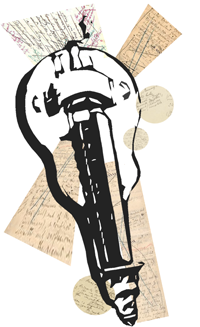I come from a part of the country where even white boys go to war. I’m the first in my family not to have worn a uniform. My older cousins came back from Vietnam with plates in their heads or with hands that still haven’t quite stopped shaking, even now, as they squint through smoke over the afternoon’s second vodka. My father saw his mother burst into tears at the news of Pearl Harbor because she knew that her older boys, my uncles, were going to war. He ran away to enlist in the Air Corps underage just to be shipped home from a Texas depot. But he was old enough to enlist for Korea, only to lose an eye to a bayonet in a training accident, friendly action that ignominiously disqualified him for a Purple Heart.
My great-grandfather and grandfather fought together in the same war, the one that was supposed to end all wars. My great-grandfather in the infantry was gassed outside Paris, and my grandfather in the Navy was in the expedition to Odessa that retrieved the bodies of the Polar Bear Brigade, Michigan National Guardsmen who had frozen or starved to death in Russia during the West’s effort to unseat Lenin at war’s end.
He went on to be a China sailor in the twenties, and later in the thirties marched with the other veterans for his bonus all the way from Morgantown West Virginia to Washington, DC. There he saw Field Marshal MacArthur in uniform and his adjutant Colonel Eisenhower on a white horse, behind them on the Capitol steps sat big water-cooled Brownings, and behind them, squinting beneath their Smokey the Bear campaign hats, soldiers desperate enough to take peacetime pay ready to spray thousands of thumb-sized bullets across men who had fought beside them in the trenches. He saw as well the veterans’ tent city go up in flames at night on the other side of the Potomac, even though Julius MacArthur and Octavian Eisenhower had promised them sanctuary. When he got the bonus for which he’d marched, my grandfather spent it on a Model T, and later, drunk, crashed it into a Morgantown trolley.
The ships that took him to Odessa and Shanghai were ships from the century before, so at the age of sixteen, in 1917, he first stood on the wooden deck of a big sloppy iron-hulled frigate that might still have had masts and riggings and who knows maybe a sidewheel rather than a propeller, because when Grampap first put on a uniform Gettysburg was closer to him than Omaha Beach is to me. When he trudged off to the train station to take the long cindery ride to Newport News and the nation’s service, he had surely shaken farewell with the palsied hands of men who had worn Union blue or rebel Grey.
He had served on ships with fat iron hulls and skinny wood decks in a day when men were not deemed alike, living or dead. And on those ships distinctions were strictly drawn among the dead just as they had been among the living: An officer was nailed up in a lead coffin for eventual landside burial; a sailor sewn up in his shroud and weighted down with shot and dropped into the sea to await resurrection with the drowned. But petty officers were neither fish nor fowl, undeserving of aristocratic coffinage but equally above a simple heavement over the side. And so a compromise was struck, and a good one: Petty officers (deceased) were stuck in forty-gallon barrels of alcohol; thus pickled bided their time until landfall or the last trump.
But the swabs who had served under them were less patient. When the petty officer had been packed away to await the end of time they crawled to the deck below and drilled through the overhead into the cask in which their late superior was entombed, confident as Tut of his undisturbed passage into the next life. They drained out his supporting amniotic alcohol and drank it pint by meaty hundred proof pint. So when port was at last made and the CPO was swung down in an offloading net and his family breached the cask like Montressor with his amontillado, they met not a forty-three-year old tattooed naval fetus swimming in a sea of rum but a desiccated husk rattling like a pea at the bottom of a dry barrel. Shaken and sickened, like any family that’s prised off the lid of war, by the reality that was hidden beneath.




